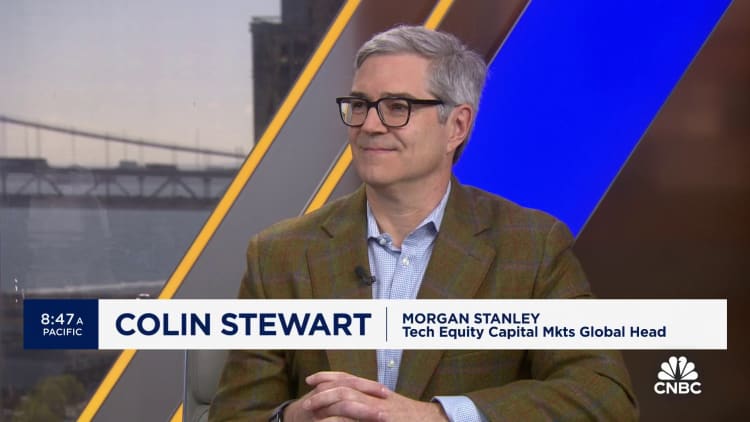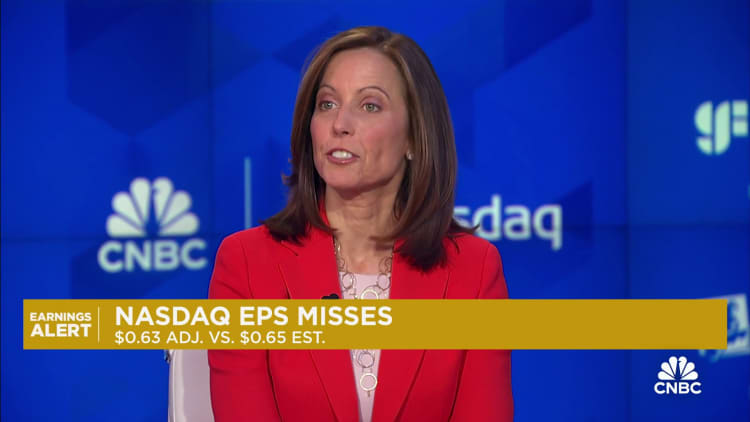Morgan Stanley banker sees 10 to 15 more tech IPOs in 2024, and a ‘better year’ in 2025


Following a long period of waiting, “the IPO market’s back.”
That’s according to Colin Stewart, Morgan Stanley’s global head of technology equity capital markets. In an interview with CNBC’s “TechCheck” on Monday, Stewart said 10 to 15 more tech companies could go public before the end of 2024, with an even “better year” in store for 2025.
“It’s been a long two and a half years, where we’ve had really nothing,” Stewart said. Recent initial public offerings have priced high and traded well, which “bodes well for the future,” he added.
The lull began in 2022, when soaring inflation and rising interest rates pushed investors out of risk, slashed tech valuations and led many tech companies to delay their plans to go public. It was a sharp contrast to the prior two years, which saw a record number of deals, including some at astronomical revenue multiples.
The IPO market cracked open in September, with the debuts of Instacart and Klaviyo. But the first real signs of momentum came last month, as Reddit became the first IPO for a major social media company since Pinterest in 2019 and data center connectivity chip company Astera Labs rocketed on its first day of trading.
Both stocks remain well above their IPO price, with Astera up about 145% as investors pour money into all things tied to artificial intelligence.
Morgan Stanley was the lead banker on the Reddit and Astera IPOs, positioning itself to collect roughly $37 million in total fees.
Wall Street rival Goldman Sachs led the latest venture-backed tech IPO last week. Rubrik, which develops data management software, jumped 16% in its New York Stock Exchange debut.
Bipul Sinha, CEO, Chairman & Co-Founder of Rubrik Inc., the Microsoft backed cybersecurity software startup, waves a flag while posing with employees during the company’s IPO at the New York Stock Exchange (NYSE) in New York City, U.S., April 25, 2024.
Brendan Mcdermid | Reuters
Stewart, who’s had a hand in some of the largest offerings of the last few decades, said it usually takes six months to take an IPO to the finish line. That means companies currently considering an IPO are likely to hold off until 2025 to avoid intersecting with the U.S. presidential election in November, he said.
As for valuations, Stewart said the market has retreated from the peak days of 2021, and multiples in software and other parts of technology are now back to levels seen in 2018 and 2019. Stewart described 2021 as an “amazing year” but also “exhausting.”
“What’s happened in the last six to 12 months is that the market has gotten more comfortable with paying for growth again,” Stewart said. “We’re not back to the levels of 2021, but we are getting a fair price for growth. And I think at those prices, you’re starting to see companies say, ‘You know, it’s actually not bad to be a public company.'”
Still, the most valuable, late-stage companies have yet to hit the exits. That list includes Elon Musk’s SpaceX along with Stripe and Databricks.
While Stewart said he’d “love to take them public,” he acknowledged that the challenge for the bigger names is “they’ve got scale, they’ve got growth, investors are giving them lots of capital” and they’re investing toward the future.
“Right now the IPO is not on their near-term horizon, unfortunately,” he said. “But when it does come they’ll be blockbuster.”










